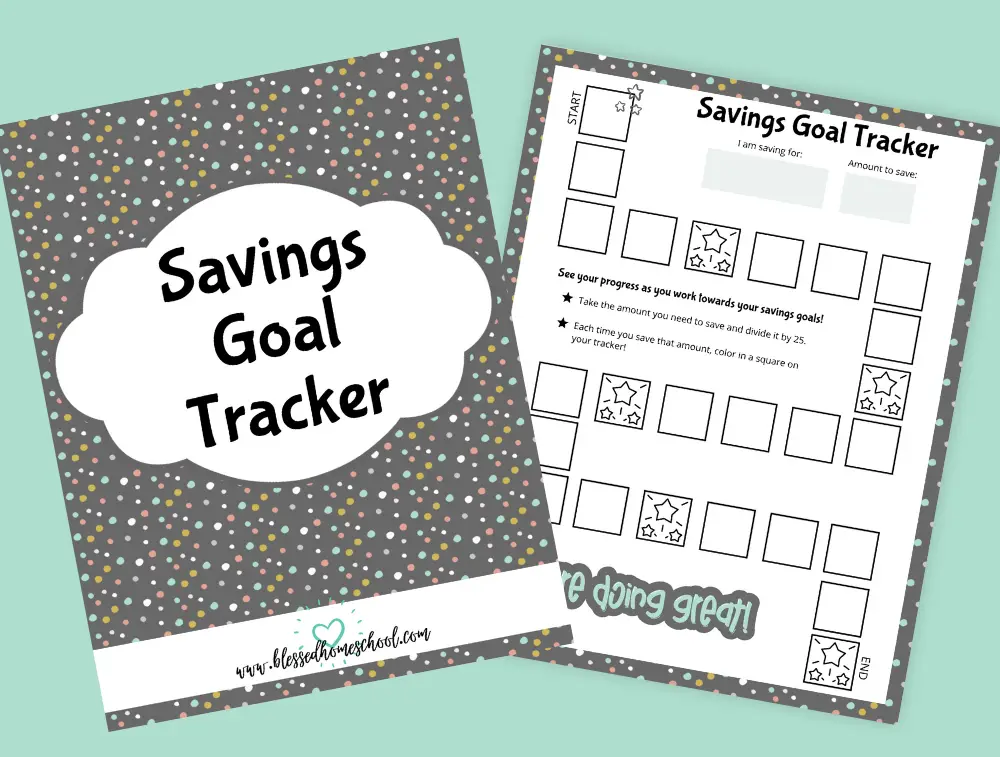Teaching Kids About Money? 9 Things You’ll Want to Cover
Just so you know, this post contains affiliate links. That means if you use them to make a purchase, I may earn a commission. You can read my full affiliate disclosure HERE.
Teaching kids about money and how to handle it is such an important life skill – it’s never too early (or too late!) to start. Here are some tips I’ve learned and resources I use to help you with their financial education.
It wasn’t until I was in my 30’s that I read the book Total Money Makeover by Dave Ramsey. My husband and I had been married for roughly 12 years already and had 3 kids; with all the life experience under our belts by that time, we seemingly had a lot going for us, but our handle on money was less than desirable.
Like so many people, we lived on loans and credit. We never had a plan for our money. Shamelessly, we paid little attention to how much was really being eaten away by interest rates, and thought that we were doing ok since we always paid all of our bills on time.
I truly cringe thinking about how foolish we were. To only be able to rewind the clock, huh? To go back and apply the valuable lessons we know now to our financial situation.
It’s so easy nowadays to be tempted by credit cards and loans; debt is often deemed normal. It’s so important to be aware of the effects of the choices we make (and to make wise decisions). My husband and I vowed to teach our kids to be better than us in this area, and help them learn from our mistakes.

I am so thankful for the opportunity to teach important life skills like this in our homeschool. It’s never too late to learn (but even better when we can get them started early-on with learning financial responsibility!). We need to teach our kids the value of money and how to be financially responsible, and for us that means: how to save, give, spend, and budget smartly.
Things We Changed
Once we decided we were all in and wanted to get serious about our finances, these are the most important things we changed right away:
- We actually created a budget. Meaning, we actually sat down and looked at our income versus expenses, and gave every dollar a place to go. There are many budgeting tools available, but we started with (and still use) EveryDollar to help us budget and balance our bank account each month.
- We began following the “Baby Steps” (as Dave Ramsey calls them). We started a small savings account and then began chopping away at our debt.
- We got rid of all credit cards (scary!). This is the step that was actually pretty nerve wracking for us – we relied on credit way too much, which was a big part of the problem. We locked them away and stopped spending on them, and once we paid each one off, we cancelled them. This was about 4 years ago now, and we haven’t looked back!
- We started giving our kids an allowance. We realized early on that we needed to do better for our kids, and we needed to teach them better (and early on) how to manage money. We do assign weekly chores to each kid, and we reinforce to them that everyone has a role in contributing to our household; but we did want to make sure they were earning money as well so they can practice being responsible with it.
- We stopped buying everything for the kids on a whim (ok, mostly me). I love giving gifts – and I love buying things for my kids (the grocery store checkout lane gets me every time!). But I realized that if they are going to have their own money to spend, I was going to have to pull back on the random things I bought for them. We wanted them to start learning how to save up for something and how to manage their money well.
In other words, we completely changed how we had been thinking about (and spending) our money. I didn’t realize beforehand how irresponsible we were being, and am so thankful for the changes we have made that will help us (and our kids!) in the long run.
…RELATED POST…
Personal Finance Course for Homeschool Teens
9 Things I Want My Kids to Know About Money
We didn’t have many conversations about money with my parents growing up. I don’t think I could have told you how much money they made at their jobs, what their budget looked like, or how they managed their money. My husband and I both agree that we want a different “finance-culture” for our family!
We agree that it’s important for them to practice now when they are younger and have smaller financial decisions with smaller consequences. The lessons (we hope!) will translate when they are young adults who need to manage their money on their own! Here are 9 things we want our kids to know about money:
Don’t spend money you don’t have.
Being in debt is no fun. Our kids know that what they have in their “spending” fund is what they have to spend – period. If you don’t have the money, you can’t buy what you want!
When they pout about this, I ask them, “Why don’t you see what the cashier at the store thinks? Let’s take that toy/video game/book/etc. up to the counter and see if you can pay it with the money you have.” They get the point that it doesn’t work that way.

There have been occasions when they have asked to borrow money from a sibling and tell them they will pay them back. We have talked to them about interest and how when you borrow money, you often end up owing back more than what you borrowed.
We have let them learn the hard way on this one. It’s definitely hard for them to swallow when they get their next allowance and then have to hand it right over to a sibling to pay them back for something they bought a month ago. But I’d definitely rather have them learn these lessons while the price to pay is still small!
The value of good work.
This is a skill they will need to know for life! I mentioned that we give our kids an allowance each month, and that they have chores assigned to them. They do realize the need to contribute to the household; and they also realize that if they don’t contribute or do a poor job, they don’t get paid.
We will sometimes pay them extra for a task we need help with that goes above and beyond, and we don’t over-inflate the commission. We want them to know that money is earned from good, hard work, and it’s important to have a strong work ethic (and not just expect things to be handed to you all the time).
It’s important to us that our young children know how to do good work to earn income, and also feel that sense of accomplishment for jobs well done.
Have a plan for every penny.
In other words, create a budget.
If you don’t plan for where your money should go, it’s easy to lose track of and slip into poor habits.
Our kids are still a little bit on the young side for learning this skill (they don’t really have their own expenses right now other than a toy or game here and there they want to buy!), but pretty soon we will start at least showing them how we budget each month. Getting them familiar with the process will be an important first step before they eventually have to do it on their own.
For now, we teach our kids to sort all incoming money into their spending, savings, and giving funds. My Money Manager for Kids is a great printable you can use to teach your kids these habits.

Think twice.
Money tends to burn holes in my kids’ pockets. The minute my 7-year old daughter has spending money, she wants to look for something to buy. Impulse buys can be so hard to resist, and it’s important we practice strengthening those waiting muscles!
I am working hard to teach my kids that just because you have money does not mean you need to spend it right away. There is way too much instant gratification these days. If there is something you really think you have to have, sit on it for a day and see if that urge is still there tomorrow. She is finding most often it is not.
Comparison shop.
There are many options these days for where you can purchase something. In relation to taking time to think about purchases, we want our kids to know that you don’t always have to buy something from the first place you look.
Take the time to research the best options and prices for what you are going to spend your money on. Sometimes the difference is small, but every little penny adds up!
Have an emergency fund.
We didn’t have an emergency fund for the longest time (hence the reliance on credit cards, and loads of other problems!).
It can be hard to let extra money “sit” in case of an emergency, but the truth is, you never know what might happen that you’ll need extra cash. If you make the choice to get out of debt and get rid of your credit cards especially, you’ll want at least a small fund built up in the beginning (you can gradually add to it along your journey until you get it to where you want it to be).
We want to teach our kids to prepare for the curveballs life might throw at them, so they aren’t caught off-guard.
Be generous with what you have.
All of the money we have, everything we have, is a gift from the Lord. I want my children to understand this at a young age, and practice setting aside some of all money they receive for giving to others and doing good.
We are to be good stewards of what has been entrusted to us, and that includes giving to others. It’s important to us to set a good example for our kids, help them set aside some of their own money to give, and show them opportunities to do so.
Have money conversations.
Although discussing money can be difficult, we don’t want it to be a taboo topic in our home.
We want to be transparent with our kids and let them know what it takes to manage finances for a family and household, so that they can feel more competent someday doing this on their own.
Our kids will learn how we have learned and changed from our mistakes. They will know what our budgeting process looks like, and how much things actually cost! My husband and I look forward to continuing these conversations with our kids as they grow up.
Set financial goals and work to achieve them.
My husband and I now know the value of setting goals for large purchases, and then working it into our family budget to save for them. Sometimes we put a little aside at a time, and sometimes we do extra work to earn more to be able to reach that goal.
We want our kids to know how to set a goal and the joy that comes with actually saving up for it and being able to purchase it with their own hard-earned money!
Free Printable Savings Goal Tracker
Kids will be ready to learn different aspects of money management at different ages. However, no matter how old your kids are now, you can start teaching them good financial literacy and good money habits!
Here is a freebie I created that is an easy visual your kids can use to set a goal and work to reach it. They will love coloring in the chart as they make progress on their savings goals.

Grab the printable to day and take one step in the right direction of teaching your kids to be smart with their money at an early age. I hope you enjoy it!
I would love to hear in the comments below: What are the things that you want to make sure you teach your kids about money? Let me know!

Related Posts
- 7 Key Reasons Your Should Give Your Kids an Allowance
- Best Books and Games to Help Teach Kids About Money
- Homeschool Tracking Does NOT Have to Make You Crazy!
Blessed Homeschool is a participant in the Amazon Services LLC Associates Program, an affiliate advertising program designed to provide a means for sites to earn advertising fees by advertising and linking to Amazon.com. You can read my full affiliate disclosure HERE.





